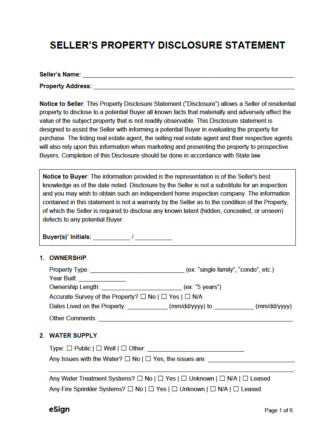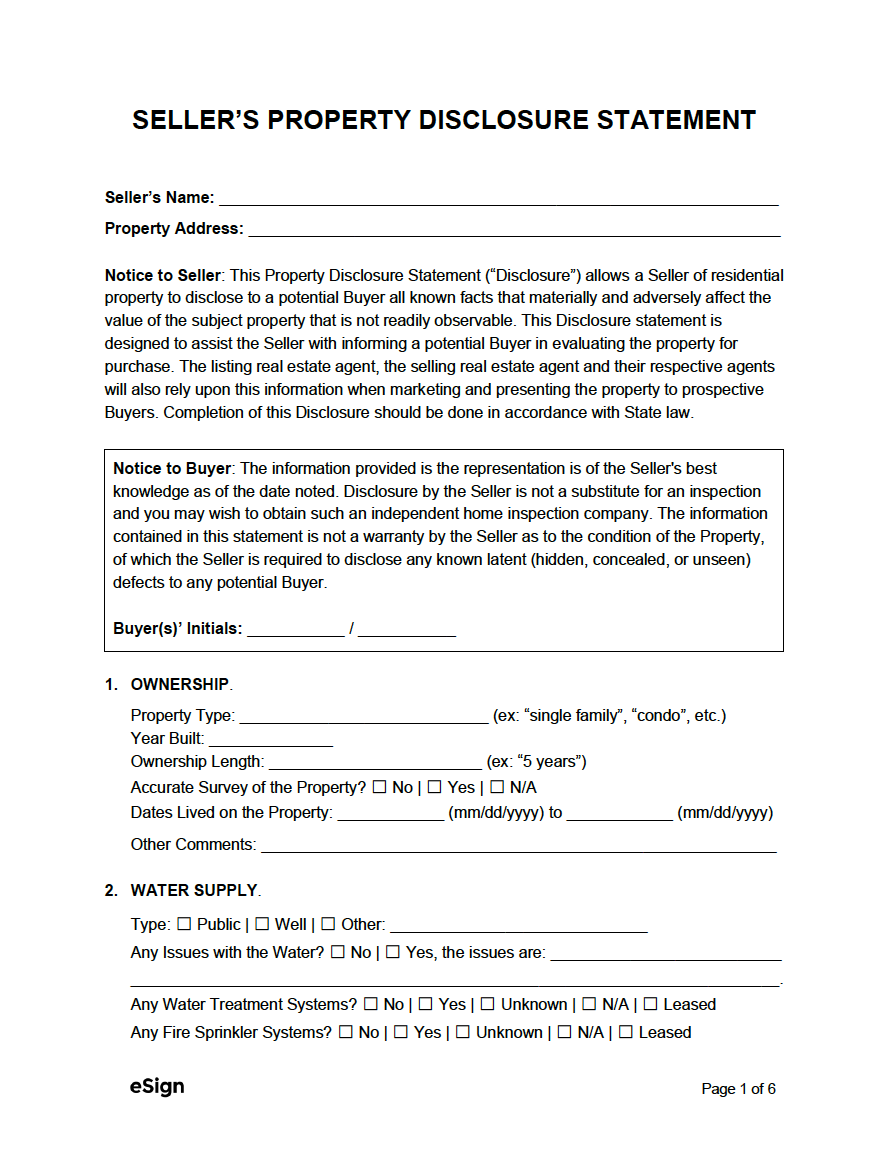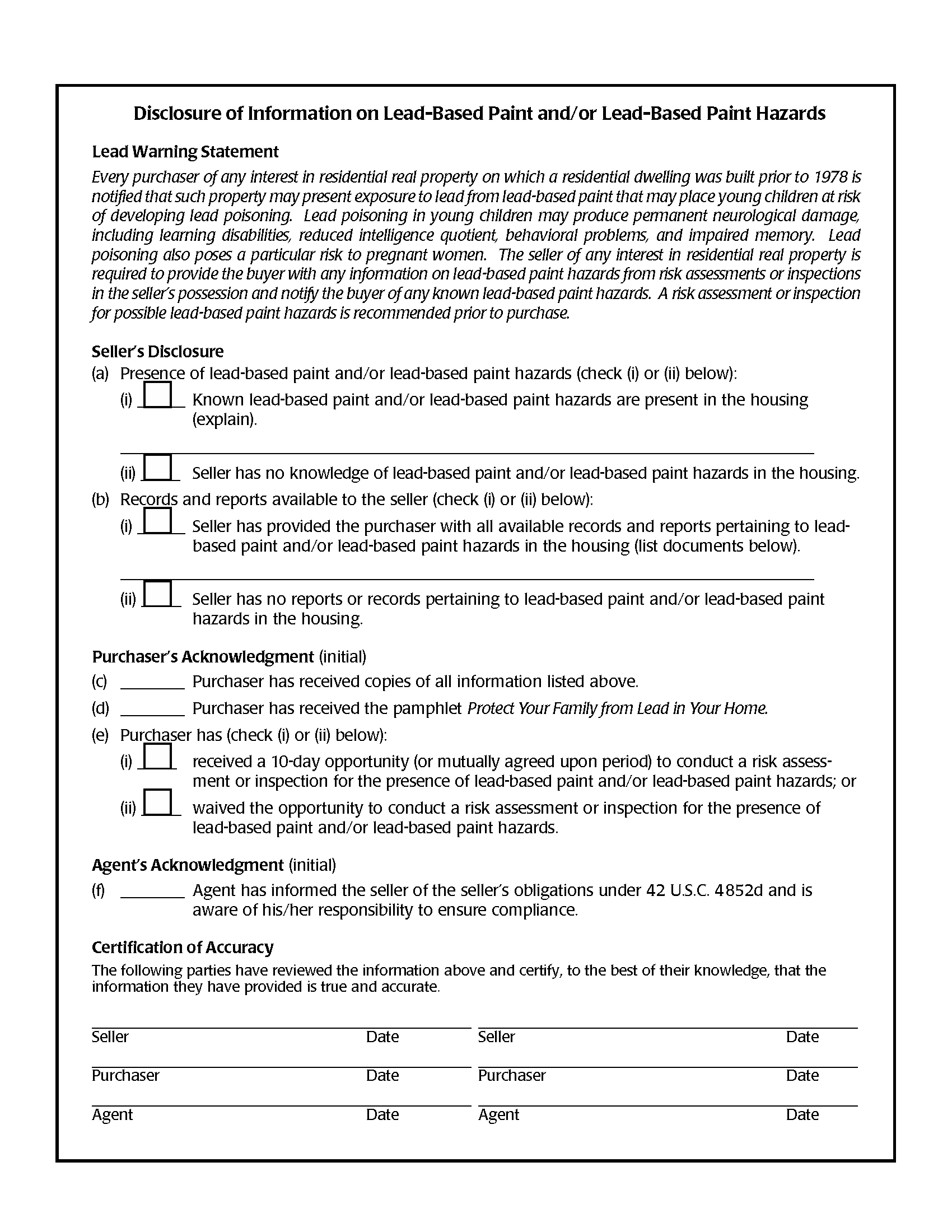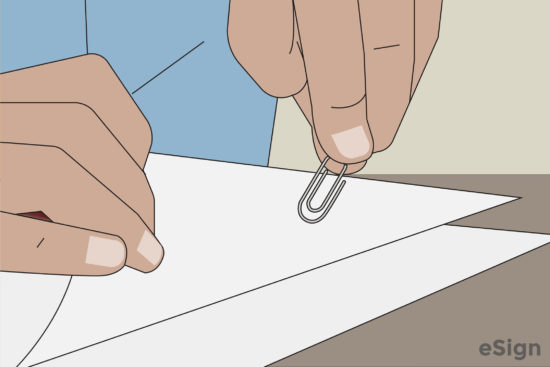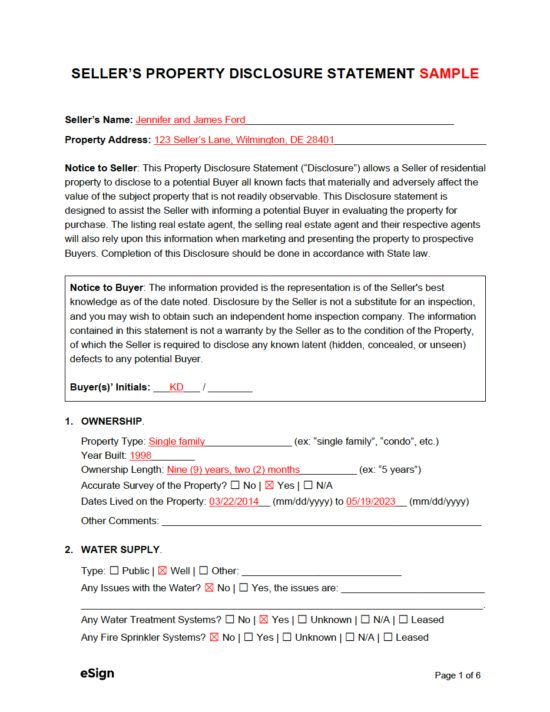A property disclosure statement is a form used to list any existing issues or defects with a residential property. It is completed by the seller and sent to the buyer before entering into a purchase agreement. While nearly all states require this form as part of a real estate purchase and sale transaction, they often differ in the exact information that must be disclosed.
By State
- Alabama
- Alaska
- Arizona
- Arkansas
- California
- Colorado
- Connecticut
- Delaware
- Florida
- Georgia
- Hawaii
- Idaho
- Illinois
- Indiana
- Iowa
- Kansas
- Kentucky
- Louisiana
- Maine
- Maryland
- Massachusetts
- Michigan
- Minnesota
- Mississippi
- Missouri
- Montana
- Nebraska
- Nevada
- New Hampshire
- New Jersey
- New Mexico
- New York
- North Carolina
- North Dakota
- Ohio
- Oklahoma
- Oregon
- Pennsylvania
- Rhode Island
- South Carolina
- South Dakota
- Tennessee
- Texas
- Utah
- Vermont
- Virginia
- Washington
- West Virginia
- Wisconsin
- Wyoming
 Lead-Disclosure Statement
Lead-Disclosure Statement
This form is mandated by the Federal government and must be attached to the Purchase Agreement.
Download: PDF
Contents |
What is a Property Disclosure Statement?
A property disclosure statement is a document that is provided to the buyer of real property after an offer will (or has been) made. It is a requirement for those entering into a purchase agreement and is often attached as an addendum to the agreement itself.
The statement informs the buyer of any serious issues that affect the property as well as defects that have recently been addressed. It is the seller’s duty to inform the buyer of any issues they know about. In other words, if the seller did not disclose an issue but they were unaware of its existence, they cannot be held liable for not informing the buyer of said issue.
What Must be Disclosed?
Although the information a seller must disclose to the buyer varies state to state, sellers generally need to disclose if the property has/had any of the following issues:
- Issues with water/heating/air conditioning systems.
- Plumbing clogs or leaks.
- Liens against the property.
- Bugs, termites, or other pests.
- Zoning violations.
- Hazards such as lead paint, mold, asbestos, etc.
- Property line disputes.
- Repairs and renovations that were done without a permit.
- Any leaky windows or doors.
- Roof damage or leaks.
- The property is in a flood zone.
- Someone died or was murdered on the property.
- A crime that recently occurred (such as a meth lab on the property).
- General information on the property (utilities, ownership history, year built, etc.).
Note on “Buyer Beware”
Also known as “caveat emptor,” buyer beware is a phrase that means a buyer is purchasing real estate “as-is.” Several states are considered “buyer beware” states, effectively placing the responsibility of finding issues with a property on the buyer.
With the exception of toxic/dangerous issues (such as asbestos), the seller is not obligated to disclose damage and issues with the property. The following states employ laws that can be interpreted as buyer beware:
- Alabama
- Arkansas
- Colorado
- Florida
- Indiana
- Massachusetts
- Missouri
- Montana
- New Hampshire
- New Jersey
- Virginia
- West Virginia
- Wyoming
How to Use (4 Steps)
Using the disclosure form is a fairly straightforward process; as long as the seller makes a conscious effort to disclose all known issues with the property, they will be free from any liability once the sale goes through.
Step 1 – Download Form
Click on the state that corresponds to the state the property is located in. This is very important, as each state has specific requirements as to what the seller will be required to disclose to the buyer. The document can be completed by clicking on the PDF form and completing it online, or it can be printed and completed by hand with a pen (a pencil should not be used).
Step 2 – Inspect Property
Using the disclosure form as a guide, the seller will need to walk through the property and visually inspect each component for signs of damage or wear. Test out appliances and utilities to ensure they work (flush the toilet, open/close windows, run the hot water, etc.). Inspect the walls, foundation, roof, and other major areas.
Being honest and upfront will improve the buyer’s trust in the seller, especially since a home inspection will reveal nearly everything that would be reported in the disclosure anyway. If the seller doesn’t live in a “buyer beware” state and they purposefully withhold a known issue with the property from the form, they could be liable for it later on.
Step 3 – Sign It
Once the seller has answered each question honestly and to the full extent of their knowledge, they can sign the disclosure. Their signature can be recorded by printing the form and signing by hand, or by uploading the completed form to eSign and signing it electronically.
Step 4 – Send and Attach
The seller will need to send the signed disclosure to the buyer via mail and/or via email. Once the buyer has reviewed each page of the agreement, they will need to initial on the first page and sign their name on the last page. If the parties will be entering into a purchase agreement, the disclosure should be attached to the last page of the contract.
Disclosure Laws: By State
Sample
Download: PDF, Word (.docx), OpenDocument
